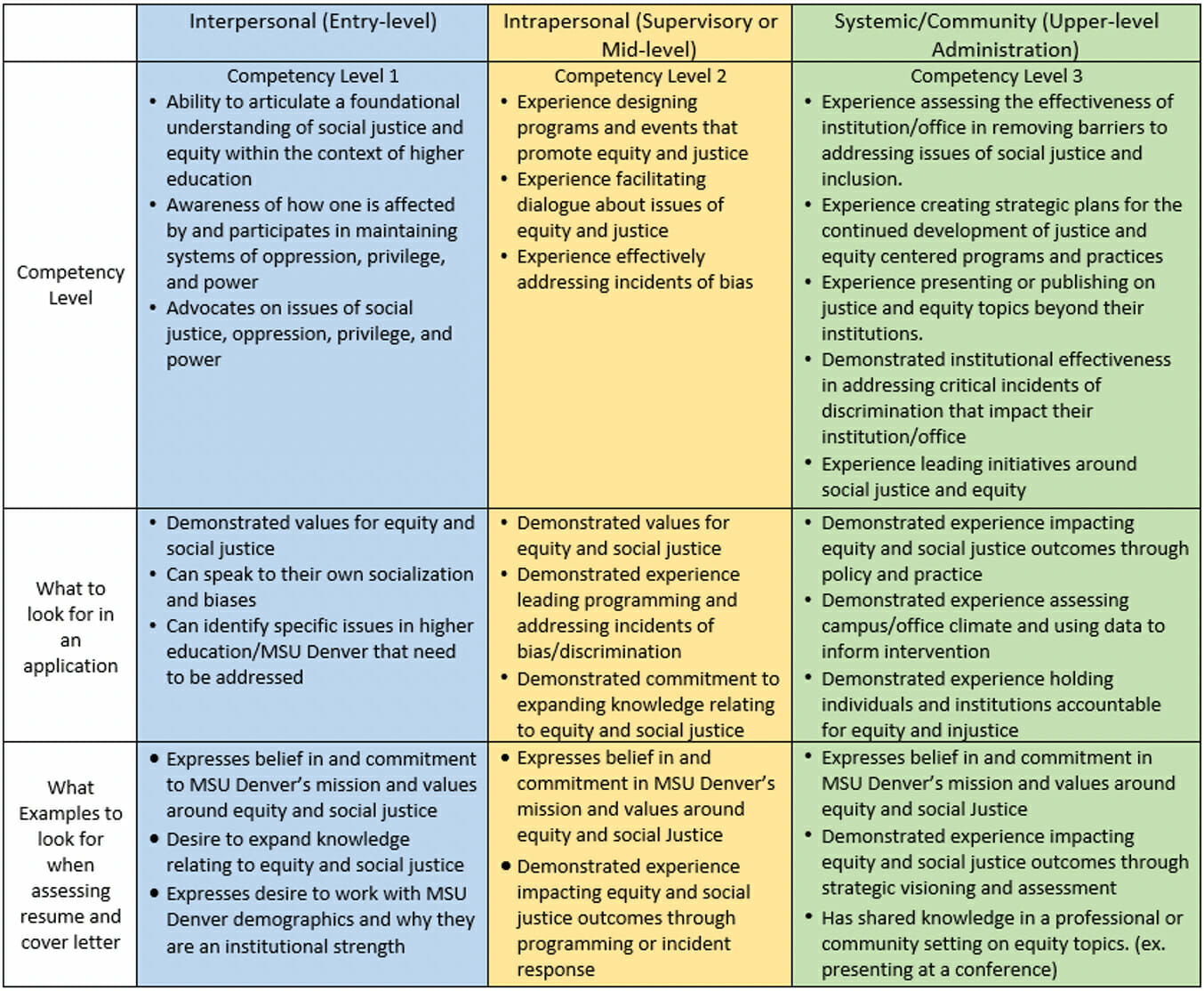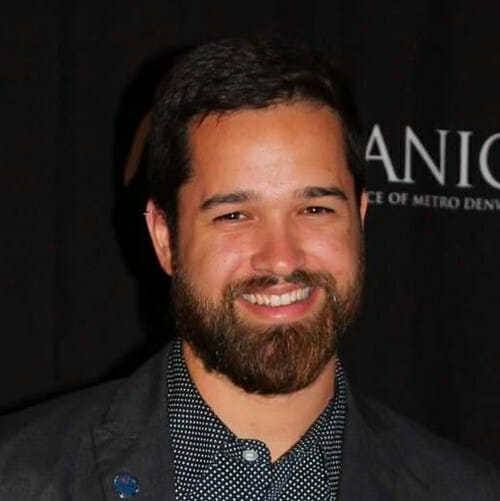
Eric Silva MSE
Assistant Director TRIO Student Support Services at Metropolitan State University of Denver Ally Garcia EdD
Assistant Dean for the Center of Equity and Student Achievement and the Director of TRIO Student Support Services at Metropolitan State University of Denver
Higher education, since its inception, has been exclusive in who can pursue higher levels of learning and engagement. This oppressive truth not only has subjected students to pain and trauma, but also the faculty and staff who work within those ivory towers. In order to interrupt, and hopefully change these marginalizing spaces, it is paramount that institutions of higher learning acknowledge, assess, and devote resources and time to deconstructing practices, policies, and procedures which have been normed on the exclusionary nature of higher education. This position often toys with the theoretical question of the overall mission of higher education and its connection to serving the public good. The following work was our form of resistance to normative hiring structures within Student Affairs. Although not exhaustive, the work below may help guide you and your institution on its own journey of assessing and changing current hiring and promotion structures to truly serve the public good.
The process
In the fall of 2018, the Vice-President of Student Affairs tasked the Center for Equity and Student Achievement staff to develop processes that ensured the hiring practices of our division were equitable and valued the hiring of staff with experience doing equity and justice work. Having been on numerous committees attempting to tackle this challenge, we set out to try something new.
With the support of our Vice-President, we reached out to colleagues across campus with interest and experience in this task and sought to bring together folks who shared a commitment to the values of equity and justice. Though the emphasis of the materials we would be developing was on the hiring of Student Affairs staff, we included staff and faculty from outside of the division to contribute to the packet’s development. We strategically included staff from Human Resources, the Office of Diversity and Inclusion, Career Services, Admissions, and faculty from a number of departments.
Rather than drag out the process over the course of a semester and compete with a number of other priorities and scheduling challenges, we invited committee members to join a full-day intensive retreat to begin developing the materials. We scheduled the retreat for two weeks prior to the start of the spring 2019 semester and gave committee members access to the research we had compiled based on the best practices of other institutions. We also set clear goals for the group to accomplish.
- For all applicants
Develop a diversity statement to be placed at the top of every posting that spoke to our division’s values and the demographics of our campus. - For qualified applicants
Create a sampling of qualifications that could be applied to most SA positions that highlighted applicants need to demonstrate commitments to equity and justice. - Demonstration of applicant values
Create a basic set of interview guidelines that would help to mitigate bias and allow applicants to speak to their experiences. - Attracting qualified candidates
Identify where to post positions to reach a diverse audience. - Identifying next steps
Identify the pieces of the puzzle that were still missing at the end of this retreat.
The day of the retreat, we assigned individuals to groups of four and asked them to begin working on their assigned charge. After an hour, we rotated folks so they could add to the work and perspectives of others. We did this 4 times so that each person could touch each of the goals to critique and build upon the work of the other groups before. This culminated in a presentation of the first draft of each goal. We also spent the final hour and a half of our meeting discussing the areas of the hiring process that still needed to be addressed, and the tools we would need for the first drafts to be useable.
As chairs of the group, we spent the next few weeks gathering feedback and institutional buy-in from division leadership to continue moving the initiative forward. Along with the first draft of the packet, we submitted feedback to our vice-president on the steps needed to continue development and success of the initiative. After these initial edits, our General Counsel, Office of Equal Opportunity, Office of Diversity and Inclusion, as well the head of our Human Resources department all provided feedback to ensure we were staying within the bounds of hiring laws and to give their stamp of approval to begin utilizing the packet.
As the packet began to circulate through the Division of Student Affairs, we continued to gather feedback from search chairs and make edits. The COVID-19 pandemic in the spring of 2020 led to a hiring pause, disrupting our groups’ ability to gather feedback. We took this opportunity to plan the next steps for our group in the summer of 2020.
This second meeting focused on developing the trainings required to ensure the packet would be correctly utilized and to build-out additional training resources. We recognized that the packet itself could only be as effective at navigating issues of equity as those who utilized it. The trainings added opportunity for search committees to address the biases that exist within their group and created an evaluation tool for departments to help address the pre-existing equity issues within their departmental cultures.
The results of our work
- After studying several statements from other institutions, as well as our own institutional mission statement, we ultimately created this statement:“(Name of our Institution) is a unique, access-oriented campus community that values diversity, equity, and inclusion in all its forms. Our student population consists of nearly 50% first generation students and over 45% students of color. We are a designated Hispanic Serving Institution located in downtown Denver. We create an equitable learning and working environment in concert with individuals who consistently demonstrate commitment to equity and inclusion. We greatly value the diverse identities and perspectives of our students, faculty, and staff and recognize that in order to achieve a just and equitable society, diversity must go beyond simple representation. It requires critical inquiry and dialogue and a commitment to action. We strive to provide a culture of belonging for all community members to achieve personal and professional success.”We felt strongly that this statement communicated our values to applicants and hoped that it would entice equity-minded applicants to explore our postings further.
- We utilized the NASPA and ACPA competencies to help us build the following chart that would help search committees identify a candidate’s level of competency, while also creating clear measures for accountability as staff looked to advance within the division.

- We developed a list of questions that search committees could autonomously draw from based on the position. Some examples include:
- Explain a time when a student spoke to you about an equity barrier they were facing and how you helped them address the situation?
- What tools/techniques do you bring for promoting collaboration among underrepresented groups?
Further, we grouped and categorized questions based on the competency chart. An example of how to identify whether a candidate for a Senior Administrator position has helped bring about systemic change on their campus includes the question:
- When have you challenged a leader or policy that you felt was unjust? How did you address it?
- Tell us about a time you recognized student needs weren’t being prioritized in an institutional process? What was the challenge and what steps did you take to address it?
- We created a comprehensive list of locations that our Human Resources department commonly posted to and expanded upon it to include numerous identity-specific job boards and social media groups. We made sure to include representation across identity categories including marginalized religious groups, gender and sexuality diverse groups, veterans, people with disabilities, racial and ethnic based groups, and more.
- We utilized our second meeting in the summer of 2020 to finalize the next steps of our process. We developed three different sets of trainings as a follow-up to the original packet of materials. The first set focused on helping search committees navigate the packet itself with a series of videos explaining each section of the packet and prompting search committees to engage in reflection activities after each section. The second focused on addressing implicit bias and strategies to mitigate its impact on searches. This training was recorded and available online for search committees, prompting them to engage in group discussion around how they can address their biases together, and how to navigate when biases show-up. The final training extends beyond the search committee and was developed as a departmental self-evaluation. The evaluation was designed to help offices preparing to hire staff to assess the ways that they demonstrate a commitment to equity and justice. The activity was developed to encourage offices to engage in conversations of equity and justice beyond the search and ensure that there would be alignment between the values we were asking of applicants, and those already established in the offices and departments that they could be working in.
Key challenges and how we overcame them
- Gathering our stakeholders
Due to the many areas of campus that were included in the initiative, it was challenging to keep the initiative moving forward. We met for the first time in January of 2019 prior to the start of the spring semester with the goal of completing the packet in one day. Finding a common day was challenging with a number of stakeholders. We incentivized attendance with the promise of lunch and tried to ensure that folks were showing-up to the meeting prepared to engage in a full-day of work and challenging conversations. We sent out a number of materials for folks to read ahead of time and made it clear that the expectation was that they showed up prepared to contribute to an analysis of the readings and a discussion on their application to the processes we were developing. - Maintaining momentum during COVID
We received the final rounds of edits around the time COVID-19 forced the closure of our in-person campus. Navigating a global pandemic and competing priorities made devoting time to this initiative challenging. - Partnering with Human Resources
We knew that this venture would potentially step on some toes. We recognized that the only way to avoid this was to invite the staff most involved in hiring processes to the table. We started with one Human Resources representative and by the end had five members of the Human Resources team contributing to the growth of our materials and committing to help guide search committees with support they might need to navigate the packet. - Social justice competency
We were intentional in seeking feedback and opinions from folks that were less versed in equity and justice work and used their questions and concerns to help us navigate potential challenges we might face in the future. We took the time to provide resources and connect our materials to published work that we could cite as we moved the initiative forward. - Looking ahead
This was one of our biggest challenges. We knew that trying to change an entire system in a day or two was a very tall task and recognized that there were plenty more challenges we could not attempt to address in one packet of information. We recognized that recruitment is only as valuable as an institution’s ability to retain, and we hope that the foundation we’ve laid will continue to be built upon as we work to retain our equity and justice centered staff.
Assessment measures
Reception of the packet has been positive. A presentation of the materials at a Student Affairs Leadership Team meeting was met with positive feedback. Folks are excited to begin utilizing the tools in their future hiring processes. At this point in the implementation process the team is still collecting data to understand the impact of the packet on shifting the culture of the division. With hiring processes at the institution being paused due to the COVID-19 pandemic, we are just now starting to see the practices applied to searches. We hope to utilize data from our Human Resources department to compare several factors from years prior to the packet’s implementation to now. These factors include:
- The diversity of Student Affairs posting applicant pools in areas of race, gender, and disability.
- The diversity of Student Affairs posting applicants who make it to first and second round interview stages.
- An analysis of the feedback being given from applicants who participate in interviews for Student Affairs postings.
We plan to also compare these data with the shifting demographic patterns across our division and hope to begin collecting additional data around employee retention, specifically comparing staff hired prior to the utilization of the packet with staff hired after its implementation.
In addition to these measures, we hope to collect feedback from the search chairs to gauge their reception to the material as well as their confidence in their ability to navigate conversations of bias.
Ultimately, we hope to compile departmental self-evaluations as well to help determine which areas of campus need support when meeting their equity goals and living out the values that our division espouses.
Moving forward
Moving forward, the hope for this initiative is a full-scale launch of the recently developed trainings. These trainings will be required of every staff member in Student Affairs who wishes to participate on a search committee. We also hope that by establishing the competencies highlighted above as positional requirements, we prepare our division to have tools for holding all Student Affairs employees accountable to their contributions toward justice and equity in the future. By adding competencies to positional requirements and creating clear paths to career advancement through equity and justice work, we begin to shift the culture of our division and hopefully our institution. Having a clear path to help all staff understand what their role is in affecting equity and justice is key to shifting our institutions culture toward centering the needs of our most marginalized populations.
The next steps also include a partnership with our academic affairs division to create a similar framework that will be more specific to faculty hiring and promotion. We also would like to see the expansion of our trainings to be more specialized to hiring processes done virtually in our current pandemic environment.
Key tips/pieces of advice
- Collaborate with Human Resources early; lean on their expertise
- Have frank discussions with leadership on why this needs to be a priority
- Use qualitative and quantitative data to drive your rationale, do not rely only on numbers
- Find ways to continue to support this initiative- whether that is by offering stipends or a course release for SA staff or faculty to participate
- Be okay with starting somewhere. Try not to spend too much time perfecting. This work will never be perfect or “fully” ready for debuting
Conclusion
Though similar initiatives had been working around our campus for years, this initiative was the first to be given top-down support for direct implementation. The Vice-President for Student Affairs supported our calls to make equitable hiring a priority. With his support and the support of the Human Resources Department, we began implementing the first sections of the packet with all searches under the umbrella of Student Affairs. Since the packet’s inception, Human Resources has expanded the use of the Diversity Statement to be applied to all MSU Denver position postings. We hope that the continued support from Student Affairs leadership will allow the reach of the packet to continue to expand, and for similar materials to be created that are more specific to other divisions on our campus.
Higher education continues to grapple with the challenges of being white and high SES serving, this dynamic is often reproduced in its hiring practices, and the make-up of its staff. While challenging this narrative is important for all institutions of higher learning, it is especially important for access-oriented institutions, and institutions that primarily-serve students from marginalized backgrounds. Racial and other diversity is important for students in helping them see differences of thought represented, and systems of power being challenged. This initiative gets the entire division on the same page when it comes to equity and justice work by creating a framework for accountability that will affect the future of our division. It will also impact the future of our students who will see themselves represented in the staff and faculty that serve them.
References
Ebony, By, and O. McGee. “Reimagining Critical Race Theory in Education.” Harvard Journal of African American Public Policy, p. 44.
Hecht, Ben. “Moving Beyond Diversity Toward Racial Equity.” Harvard Business Review. 16 June 2020.
House, Jeremy. “How Faculty of Color Hurt Their Careers Helping Universities with Diversity.” Diverse Issues in Higher Education. 27 November 2017.
Kohn, Margaret. “Public goods and social justice.” Perspectives on Politics, vol 18, no. 4, 2020, pp. 1104-1117.
Sólorzano, Daniel G., Octavio Villalpando, and Leticia Oseguera. “Educational inequities and Latina/o undergraduate students in the United States: A critical race analysis of their educational progress.” Journal of Hispanic higher education, vol. 4, no. 3, 2005, pp. 272-294.
Thelin, John R. A history of American higher education. JHU Press, 2011.
Tilak, Jandhyala BG. Higher Education, Public Good and Markets. Taylor & Francis, 2017.
 Eric Silva MSE, Eric Silva MSE (He/Him) serves as the Assistant Director for the TRIO Student Support Services program at MSU Denver. He has served in a wide-variety of roles across functional areas in student affairs from student housing, multicultural affairs, endowment, and first year success.
Eric Silva MSE, Eric Silva MSE (He/Him) serves as the Assistant Director for the TRIO Student Support Services program at MSU Denver. He has served in a wide-variety of roles across functional areas in student affairs from student housing, multicultural affairs, endowment, and first year success.
 Ally Garcia EdD, Dr. Ally Garcia (she, her, hers) received her Doctor of Education Degree from the University of Denver. She currently serves as Assistant Dean/Director of TRIO Student Support Services at Metropolitan State University-Denver. Dr. Garcia has been research assistant for Alliance for PROS based at Florida State University. She considers herself a critical race feminist practitioner/scholar. She won an early career award from ASPIRE in 2016 and an Inclusive Excellence award from the University of Denver in 2019.
Ally Garcia EdD, Dr. Ally Garcia (she, her, hers) received her Doctor of Education Degree from the University of Denver. She currently serves as Assistant Dean/Director of TRIO Student Support Services at Metropolitan State University-Denver. Dr. Garcia has been research assistant for Alliance for PROS based at Florida State University. She considers herself a critical race feminist practitioner/scholar. She won an early career award from ASPIRE in 2016 and an Inclusive Excellence award from the University of Denver in 2019.

